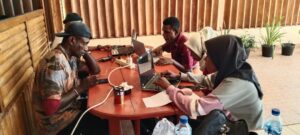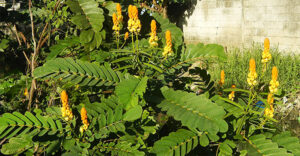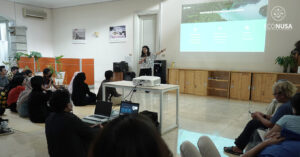
Mandoni Village, Kokas District, in Fakfak Regency, West Papua, has priceless stroke of luck from nature. One of the blessings is mangrove ecosystem, or a locally so-called mangi-mangi. The existence of mangi-mangi provides livelihood to all villagers here. They can earn their living from abundant reserves of fish, crabs, small crab, oysters on the water areas.
In addition to mangrove crabs, fish or oysters, villagers in Mandoni also cultivate nutmeg as their livelihood. Nutmeg is the source of living to the local villagers here. “But, after harvesting nutmeg, they go back to nature to hunt carbs,” said Abdul Kramandondo, the Chief of Mandoni Village, told the EcoNusa Mangrove Expedition Team in December 2019.
The increasing number of populations is inevitably expanding the sources of livelihood, as it is the case with Mandoni Village. There are getting many more people hunt for mangrove crabs. “It is true now there are many people hunt for crabs. Therefore, we should find a blank spot for crabs,” said Mama Mariam Kramandondo, a local villager who earns her living from mangrove crabs. With the limited hunting spot, she should be smarter to seek the spots with rewarding catches.
According to Abdul, crab hunting does not depend on season. There are many more people hunting for crabs due to the rising number of buyers. “When there is a buyer asking it means they should go out for crabs,” he said.
Thank goodness, mangrove crabs in Mandoni Village remains abundant as to Abdul. “When the number of crabs is decreasing, it means we should agree to have sasi for the sake of common community lives,” said Abdul.
Sasi is deemed a customary agreement made the indigenous people lasting effectively for three months. Upon reaching the expiration of sasi in three months, people are free to hunt crabs. “People will have no doubt to hunt for crabs after three months. They are free to choose. Let alone, there have been lives for the future,” said the Chief of Mandoni Village.
Abdul said that sasi is the convention made by some existing tribal clans. There are several clans in Mandoni Village, including Kramandondo, Bahba, Tiguria, Horobat with the authorities. The other village nearby Mandoni has Herietrenggi, Kabis, Kudalagi clans.
“Under the sasi, we on behalf of Mandoni community as well as the neighbors from Batufiafas, Patimburak Villages are united to organize a sasi. It is effectively enacted for three months. Upon expiration of the agreement, it means we should gather together again. We make a new customary ceremony to end the sasi so that they can go out hunting for crabs,” Abdul explained.
As the convention agreed collectively by some clans, there must not be any violation of sasi. Infringement of the convention will bear penalty as agreed by all tribal clans. “As stipulated by sasi, any violation will be fined as much as IDR33 million borne by the violator,” said Abdul. The penalty is subject to any people who hunt for crabs including outsider of the local clans.
Sasi is also imposed to nutmeg harvest which is enacted upon agreement made by several clans with nutmeg production. It has similar imposition with that of crabs. “We agree with sasi. Six months later we will sit together for another ceremony. We talk about a new sasi, then it is open to anyone to harvest (the nutmeg) again,” said Abdul.
Sasi is traditional convention inherited from generation to generation. “When we agree with the rule, it means we have to comply with it,” said Abdul.
Writer: Leo Wahyudi and Wiendy Widasari







